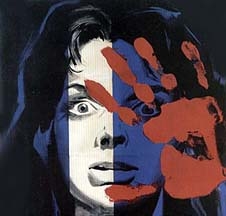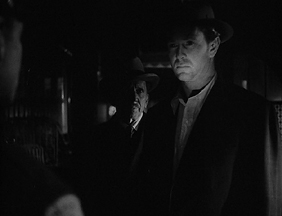
The
gothic/noir environment, 20 films:
 The
Asphalt Jungle (John Huston)
-1950 The
Asphalt Jungle (John Huston)
-1950
[Sterling
Hayden, Louis Calhern, Jean Hagen, James Whitmore, Sam Jaffe, John
McIntire, Marc Lawrence, Marilyn Monroe]
screenplay: Ben Maddow, John Huston
source: novel by W.R. Burnett
camera: Harold Rosson
music: Miklós Rózsa
A
well-planned and executed jewelry robbery runs headlong into
bad luck and treachery.
Possibly
the best heist movie of all time. Certainly an influence
on two other contenders, Rififi ('55) and The
Killing ('56). Poignant performances by Sam Jaffe and
Louis Calhern, each doing a variation on a dirty-old-man
theme. Marc Lawrence is also wonderful as a very nervous
operator with a lot to be nervous about. |
|
 Barton
Fink Barton
Fink (Joel
Coen) - 1991 (Joel
Coen) - 1991
[John Turturro, John Goodman, Judy Davis,
Michael Lerner, John Mahoney, Tony Shalhoub, Jon Polito, Steve
Buscemi]
screenplay:
Joel & Ethan Coen
camera: Roger Deakins
music: Carter Burwell
A
celebrated New York playwright, attempting to script a Wallace
Beery wrestling picture, stumbles onto the fast track to
hell at the Hotel Earle in Hollywood.
Somewhat
based on the experience of playwright Clifford Odets (1906-1963),
this is a movie about the writing process, about writer's
block and selling out. A respected playwright goes for
the money and can't pull it off, and the Coen brothers
don't cut him any slack at all. Tony Shalhoub plays a nerve-wracked
studio hack in a great performance somewhat reminiscent
of Marc Lawrence's in The Asphalt Jungle. |
|
 The
Big Heat The
Big Heat (Fritz
Lang) - 1953 (Fritz
Lang) - 1953
[Glenn Ford, Gloria Grahame, Jocelyn
Brando, Alexander Scourby, Lee Marvin, Jeanette Nolan]
screenplay: Sydney Boehm
source: Saturday Evening Post serial by William P. McGivern
camera: Charles Lang
Music: Daniele Amfitheatrof, Arthur Morton, Henry Vars
In
the wake of his wife’s murder, a cop goes on the
offensive against a politically-connected crime organization.
Glorious
Gloria Grahame is one of the wonders of Hollywood, and
this role is one of her best. Lee Marvin is also in fine
form as the two express their innermost feelings over coffee.
Fritz Lang left Germany as the Nazis were consolidating
their hold, but the vision of society in darkness came
with him, best expressed here and in Scarlet Street ('45). |
|
 The
Black Cat (Edgar G. Ulmer) - 1934 The
Black Cat (Edgar G. Ulmer) - 1934
[Boris
Karloff, Bela Lugosi, Egon Brecher]
screenplay: Peter Ruric
source: story by Edgar Allan Poe
camera: John J. Mescall
music: Heinz Roemheld
Americans
on a honeymoon in Hungary find themselves caught in a web
of revenge and satanic ritual.
Very
slick expressionist/art deco look to this, completely different
from Ulmer's grunge masterpiece, Detour ('45). This
is sadism in high style, and the style is almost as delirious
as Josef von Sternberg's masochistic ode to Dietrich, The
Devil Is a Woman made the following year. These crazed
Austro-German artists were everywhere in those days and a
damn good thing too.
|
|
 Black
Sunday Black
Sunday (Mario
Bava) - 1960 (Mario
Bava) - 1960
[Barbara Steele, John Richardson, Andrea
Checchi, Ivo Garrani]
screenplay: Ennio De Concini, Mario Serandrei
source: short story by Nikolai Gogol, "The Viy"
camera: Bava
music: Roberto Nicolosi, Les Baxter (US)
Killed
at the stake centuries ago, a woman returns from the grave
to take possession of her look-alike descendant.
Barbara
Steele is a sort of fetish goddess to her fans, who step
back in awe as she punishes and is punished. Her face is
a marvel. As in the case of Gloria Grahame, the parts don't
quite seem to belong together; but, as with Grahame, a powerful
persona holds everything in place, and the effect is mesmerizing.
Gothic maestro Mario Bava understood all this perfectly.
|
|
 Cutter's
Way Cutter's
Way (Ivan
Passer) - 1981 (Ivan
Passer) - 1981
[Jeff Bridges, John Heard, Lisa Eichhorn,
Ann Dusenberry, Nina Van Pallandt]
screenplay: Jeffrey Alan Fiskin
source: novel by Newton Thornburg, Cutter and Bone
camera: Jordan Cronenweth
music: Jack Nitzsche
Richard
Bone is witness to the disposal of a murder victim. His
aimless loser friend Alex Cutter, needles him into a pursuit
for justice that threatens a powerful local buisnessman.
John
Heard plays an alcoholic Vietnam vet and Jeff Bridges an
unmotivated hustler, two men attempting to find meaning in
the sludge. The term neo-noir fits quite well, but the film's
personality is unique. Some viewers and critics found the
three protagonists (the two above + Lisa Eichhorn) to be
completely unlikable. True, their flaws run deep, but I'm
always rooting for them down to the wire.
|
|
 Decoy (Jack
Bernhard) - 1946 Decoy (Jack
Bernhard) - 1946
[Jean Gillie, Edward Norris, Robert Armstrong,
Herbert Rudley]
screenplay:
Nedrick Young
source: story by Stanley
Rubin
camera: L. William O'Connell
music: Edward J. Kay
A
man on death row is the only one who knows the location
of $400,000 in stolen money. His mistress plots to revive
him after his execution and recover the stash.
Two
British actresses who showed up as femme fatales in very
American movies had a real knack for noir. Peggy Cummins
in Gun Crazy ('49) and Jean Gillie in Decoy.
Neither went on to great things, though they had what it
took. Gillie died of pneumonia not long after Decoy was
released. This movie is poverty row (Monogram in this case)
at its best.
|
|
 The
Devil's Backbone (Guillermo del Toro)
- 2001 The
Devil's Backbone (Guillermo del Toro)
- 2001
[Eduardo Noriega, Marisa Paredes, Federico
Luppi, Fernando Tielve]
screenplay: del Toro, Antonio Trashorras, David Muñoz
camera: Guillermo Navarro
music: Javier Navarrete
In
a boarding school for orphans of the Spanish civil war
the ghost of a young boy haunts the premeses in search
of revenge.
The
malevolent current that permeates this beautiful gothic entry
is that of the Spanish civil war itself as in del Toro's
companion
piece, Pan's
Labyrinth (2006). The setting shifts between the humid
grey orphanage basement to the arid yellow plain outside,
one as threatening as the other.
|
|
 Diva Diva (Jean-Jacques
Beineix) - 1981 (Jean-Jacques
Beineix) - 1981
[Frédéric Andréi,
Roland Bertin, Richard Bohringer, Gérard Darmon, Chantal
Deruaz]
screenplay: Beineix, Jean Van Hamme
source: novel by Delacorta (Daniel Odier)
camera: Philippe Rousselot
music: Vladimir Cosma, Alfredo Catalani
The
maker of a bootleg opera tape finds himself, through a
bad bit of luck, the target of Parisian mobsters. Help
comes from an unlikely duo of free spirits.
Another
entry into the "style as delirium" category, this
time the style is French pop-bohemian, something you can
also get a taste of in Le Samuraï ('67) and La
Femme Nikita ('90). The live-wire convoluted
storyline plays out like a fever dream.
|
|
 Don't
Look Now Don't
Look Now (Nicholas
Roeg) - 1973 (Nicholas
Roeg) - 1973
[Julie Christie, Donald Sutherland, Hilary
Mason, Clelia Matania]
screenplay: Allan Scott, Chris Bryant
source: story by Daphne Du Maurier
camera: Anthony B. Richmond, Roeg
music: Pino Donaggio
John
and Laura Baxter, trying to come to terms with the tragic
death of their daughter, are hounded by a series of threatening,
possibly supernatural, events.
Venice
itself seems haunted as Sutherland and Christie try to find
something, anything, to hold on to after the loss of their
child. It's difficult to tell at what point gothic mist lifts
and everyday murder comes down.
|
|

|